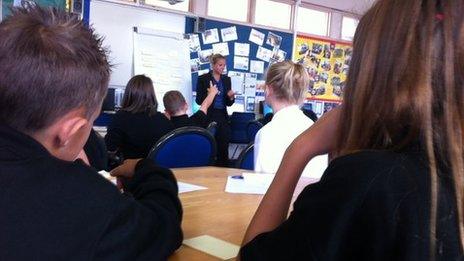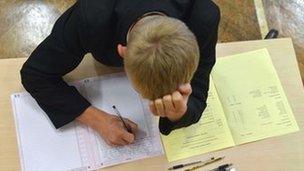Literary skills tackled by lesson change at Glyn Derw High School, Cardiff
- Published

Teachers at Glyn Derw will turn the emphasis in history and geography lessons to literacy
A high school in Cardiff has changed its school curriculum to tackle poor literacy in its youngest students.
Year 7 pupils at Ysgol Glyn Derw in Caerau will have literacy and numeracy lessons for half their timetable instead of more traditional subjects.
Head teacher Martin Matthews said history and geography would be vehicles used to improve reading and writing.
The Welsh government said it wanted to see good practice adopted throughout Wales.
Traditions challenged
Mr Matthews said Glyn Derw faced a huge challenge because 45% of year 7 pupils were classified as functionally illiterate, and just over half of the school's students were below their chronological reading age.
He said the traditional curriculum was being amended for the youngest pupils to ensure reading skills were improved.
"There's a major initiative in year 7, which is a big curriculum change, which has challenged the traditional notion of history being taught in history lessons and geography being taught in geography lessons," said Mr Matthews.
"Literacy will, effectively, be the strand running through those lessons and we use geography and history as the vehicle to support literacy development."
Glyn Derw's performance was classed as "unsatisfactory" by the most recent Estyn inspectors' report, and sits in band five, the lowest ranking in the Welsh government's school performance calculator.
Estyn noted that 79% of the school's pupils lived in one of the most deprived areas of Wales, compared to a national average of 17.4% of pupils.
Teachers say conventional teaching methods have failed to ensure pupils at Glyn Derw achieve their potential, due to poor literacy skills.
'Disadvantaged'
Anna Brychan, director of the National Association of Head Teachers (NAHT) Cymru, said the new approach could be followed by other schools.
Nicola Smith visits Glyn Derw to learn more about its lessons
"Schools are great places for innovation," she said.
"You need only look at the reams of Estyn good practice examples to see how much new thinking schools themselves are generating in the system.
"Literacy is obviously a key priority; we know pupils with insufficient literacy levels are disadvantaged because they can't access the curriculum and make the best of all the opportunities afforded them. That must be tackled."
Ms Brychan also said primary schools should also be able to opt out of the curriculum to raise literacy and numeracy standards.
"Questions about whether all the foundation subjects should be statutory for example are being hotly debated," she said.
"Should schools be judged on their ability to deliver on all the skills in the design and technology curriculum for example? Or should they be judged on their success in achieving the best possible literacy and numeracy skills during the teaching of design and technology?"
The Welsh government said it was committed to raising standards of literacy with a number of initiatives.
"We know there are plenty of excellent examples of teaching and learning in literacy across Wales, but we want to ensure that good practice is replicated across Wales so all learners can develop the skills that are so vital for future success," said a spokesperson.
"One of the most important objectives of our National Literacy Programme is to support teachers of every subject across every phase of education to become teachers of literacy.

Glyn Derw has also boosted its performance in top rate GCSE passes
"The new statutory National Literacy and Numeracy Framework, which is currently out for consultation, will provide an essential curriculum planning tool for teachers and will also set out clear annual expectations for literacy and numeracy for all learners aged five to 14."
In a separate initiative, emergency measures including extra after-school classes and close monitoring of students helped Glyn Derw achieve its best GCSE results for years.
The school saw 59% of pupils achieve at least five A to C grades, up from 33% in 2011.
"I can't remember that we had too many days when the school wasn't open throughout those six months (leading up to the exams)," said Mr Matthews.
"The commitment on the part of staff has been phenomenal. We can't keep doing that, because it's not fair."
- Published23 August 2012
- Published22 August 2012
- Published7 September 2012
- Published20 August 2012
- Published15 May 2012
- Published3 February 2012
- Published31 January 2012